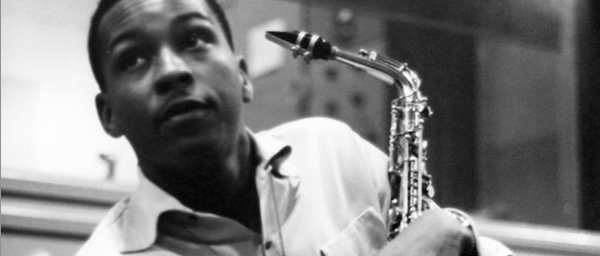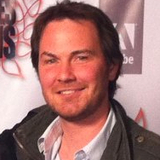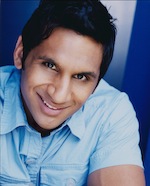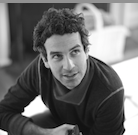Meet the Festival Filmmakers: Part 4
 In this edition of our ‘Meet the Festival Filmmakers’ blog series, we hear from five of the documentary filmmakers screening at this year’s Los Angeles Film Festival, and learn a bit about what makes them tick. To meet more of our Festival filmmakers, check out Part 1, Part 2 and Part 3.
In this edition of our ‘Meet the Festival Filmmakers’ blog series, we hear from five of the documentary filmmakers screening at this year’s Los Angeles Film Festival, and learn a bit about what makes them tick. To meet more of our Festival filmmakers, check out Part 1, Part 2 and Part 3.
 “I still can’t look at a broom without crying.”
“I still can’t look at a broom without crying.”
N.C. Heikin’s second feature documentary, Sound of Redemption: The Frank Morgan Story, will make its world premiere at the festival in the documentary competition. The film tells the inspiring story of music legend Frank Morgan, a jazz saxophonist who struggled with addiction, spent decades in prison, and then, upon his release, made an incredible comeback. The film features interviews with a wide array of people who knew Morgan, and is framed by a tribute concert in San Quentin. Heikin cites as inspiration, “Frank Morgan’s beautiful music and the idea of overcoming self-imprisonment.”
What’s your first memory of sitting in a movie theater?
My mother took my older brother and me to see Fantasia and left us in the theatre. I was four at most. I loved it until the Sorcerer’s Apprentice, which scared me out of my wits. I still can’t look at a broom without crying.
What do you love most about being a filmmaker?
Filmmaking calls on all of your powers at once, every side of your heart and brain, every ounce of your creativity. I love being so totally engaged in the process. I love the power of film to move.
What do you like least about it?
The avalanche of details.
What’s the biggest obstacle you encountered in the making of this film and how did you overcome it?
Our biggest obstacle was getting permission to give a concert and film it at San Quentin. It took us a year to break through the California Department of Corrections and Rehabilitation’s bureaucracy and disinterest, which we did thanks to James Egan’s perseverance.
What’s the biggest difference between the reality of being a filmmaker and your dream of it?
Oddly, I never dreamed of it. The reality of making a documentary is that it takes much longer than you think it’s going to, and is more complicated than it appears. Production is exciting, editing is fascinating and perseverance and luck are requirements. The reality is, without passion for the project, it won’t get done.
Have you ever considered throwing in the towel on filmmaking and if yes, what stopped you?
On my last film, Kimjongilia, about North Korean refugees, there were many times when I hit a wall. But I’d think about the North Koreans whose stories I was trying to tell and say to myself, “They’ve been through Hell. You’re just making a film.” That put things in perspective.
“Filmmaking definitely isn’t as glamorous as I thought it would be.”
Thomas G. Miller’s documentary Limited Partnership will have its world premiere at one of the Festival’s free community screenings. The film chronicles the struggles of one gay couple—an American and an Australian—fighting the United States’ discriminatory marriage and immigration policies against LGBT citizens in a desperate effort to stay together. After watching many of his friends struggle with this, Miller says, “as a documentary filmmaker, I recognized the power of personal stories that put a human face on social issues, so I knew this was a film I had to make.”
What’s your first memory of sitting in a movie theater?
My first memory sitting in a movie theater was hiding behind the seat crying while watching Disney’s Sleeping Beauty when I was four years old.
Will this be your first experience with the LA Film Festival? If not, what was your first experience—and what was memorable about it?
My first experience with LA Film Fest was last year, when a documentary film I co-produced, Code Black, won the jury award for best documentary. The crowds were so enthusiastic and it was a great experience for everyone.
What’s the biggest obstacle you encountered in the making of this film and how did you overcome it?
The biggest obstacles in making this film were the conservative political climate and finding the funding to complete it. I applied to many grants and organizations and was a finalist countless times in the early to mid-2000s, but never received a penny. I found that I was spending more time filling out applications and making pitch tapes than actually working on my film. The Bush administration was in power and there was no chance of change in LGBT equality. So I put the film away for five years and began shooting again in 2007. I applied for finishing funds with ITVS again in 2013 and finally my film was chosen! That enabled me to finish my film and have it be a part of the national dialogue on same-sex marriage and immigration equality.
What’s the biggest difference between the reality of being a filmmaker and your dream of it?
Filmmaking definitely isn’t as glamorous as I thought it would be. However, the relationships and passion exhibited by my fellow documentary filmmakers is exceptional and contagious and renews my energy and belief that I made the right choice.
 “You just have to keep pushing.”
“You just have to keep pushing.”
Filmmaker Joe Saunders will be showing his second feature film (and first documentary), Billy Mize and the Bakersfield Sound, in the Festival’s documentary competition. The film examines the life of musician Billy Mize and his enormous impact on country music, and features interviews from Willie Nelson, Merle Haggard and Mize himself, among others. Saunders had a unique perspective in the making of his documentary: Mize is his grandfather. His inspiration for the film, he explains, is simply that he “wanted to tell the story of my grandfather’s life, and it turns out his life is pretty damn interesting.”
What’s your first memory of sitting in a movie theater?
I was watching Empire of the Sun starring a very young Christian Bale. I love that movie.
What do you love most about being a filmmaker?
It gives me a legitimate reason to study, in excruciating detail, the things in life that interest me.
What do you like least about it?
Raising money.
What’s the biggest obstacle you encountered in the making of this film and how did you overcome it?
The biggest obstacle was raising money. I’m still raising money for this so I haven’t quite overcome it yet. But I have had little victories. You just have to keep pushing…and hire an Alex Greer. He helps.
What’s the biggest difference between the reality of being a filmmaker and your dream of it?
Agents.
Have you ever considered throwing in the towel on filmmaking and if yes, what stopped you?
I haven’t considered throwing in the towel on filmmaking. I’ve thought about rebranding my approach to it but I love filmmaking. Hopefully I’ll keep getting an opportunity to do it.
 “I had to learn to love her more.”
“I had to learn to love her more.”
Sister-brother team Geeta Patel and Ravi Patel turn the camera onto their own family in their documentary Meet the Patels, showing in the Festival’s documentary competition. The film documents Ravi’s dating efforts after agreeing to let his parents help him find a perfect Indian bride. The sibling duo’s unique approach was inspired out of respect for their parents. They didn’t want to film their parents at particularly vulnerable moments—many of which were crucial plot points—so they conveyed these scenes through animated sequences, narrated by Ravi. Geeta says, “It became our voice, and was the right tone for this film.”
What do you love most about being a filmmaker?
GP: The opportunity to make an impact. RP: The control in telling the story. As an actor, you are one part of telling a larger story. As a director, you get to put the whole thing together, influence every frame. I LOVE it.
What’s the biggest obstacle you encountered in the making of this film and how did you overcome it?
GP: The biggest obstacle was the six years it took to make this film and give it all our love.
RP: Obstacle: My sister. How I overcame it: I had to learn to love her more.
What’s the biggest difference between the reality of being a filmmaker and your dream of it?
GP: I never realized that for me, the way to actually have the luxury of being creative was to take on the responsibility of producing my own films… meaning learning the business side, fundraising, bookkeeping, social media, everything. My dad, a small business owner, gave me this advice many years ago, and it saved me.
RP: THAT IT’S REALLY HARD. It is so much time, and there was so much about it that was not enjoyable and felt like work. Ultimately, I guess that’s why it’s an achievement, but it’s hard to remember that when you have to tell your friends AGAIN that you’re staying in to “work on the doc.” It got exhausting and embarrassing. My friends are probably expecting this thing to be eight hours long!
Have you ever considered throwing in the towel on filmmaking and if yes, what stopped you?
GP: Yes, maybe every few months… I’ll sit there for about 30 seconds, emotionally eating, thinking about the sacrifices, or the grass on the “other side”…. What stops me from giving up is that I love this work. I always have. There is no “other side.” All sides have sacrifices. The only thing that I would put my career on pause for, or switch gears for, is my family…and I would do it happily. Family always comes first for me.
RP: I did. Often. What stopped me? Probably pride. And the fact that I didn’t have a choice. I’m so glad I didn’t stop.
 “I thought I had lighting in a bottle…”
“I thought I had lighting in a bottle…”
Documentarian Gabriel London will show his film The Life and Mind of Mark DeFriest in the Festival’s documentary competition. Mark DeFriest, also known as the “Houdini of high-security prisons,” has spent more than 30 years behind bars—first for a minor misunderstanding, then for disciplinary infractions and his 18 escape attempts. The film features animated sequences illustrating DeFriest’s inventive past attempts, and London cites DeFriest’s unique story as his inspiration for creating the documentary, which has been 13 years in the making.
What’s your first memory of sitting in a movie theater?
Tron. I was 6, I think. I lived inside of that computer world for the duration of the movie. It blew my mind, as I think at that age I had trouble separating the film world from the real world.
What do you love most about being a filmmaker?
I love having a voice through film that is both artistic and political, a voice that can elevate other peoples’ stories and narratives about the world itself to a higher level of public awareness and engagement.
What do you like least about it?
Sorry to be unoriginal: fundraising.
Will this be your first experience with the LA Film Festival? If not, what was your first experience—and what was memorable about it?
I became a FIND Fellow when The Life and Mind of Mark DeFriest was one of two documentaries included in the Fast Track program at the 2010 festival. It was an intense and incredible two days of back-to-back ‘speed dating’ meetings with some great industry folks from agents to producers to distributors. Four years on, I maintain many of those same relationships as the film comes to the Festival, and still remember how well hosted and generous that experience was for me as a documentary filmmaker struggling to put my project together.
What’s the biggest obstacle you encountered in the making of this film and how did you overcome it?
At its heart, I had a hard time convincing people I had a story worth telling; that Mark was worth giving that single film ‘biopic’ platform to. True, people I spoke to about Mark—my friends, many strangers, people at dinner parties—instantly loved the facts of Mark’s case as a story, but the funding side of documentary filmmaking didn’t easily shine to a story about a single prisoner that mixed the fun of his Houdini past with the hard issues bound up in his ongoing incarceration. We overcame it by finishing the film—having our cake and eating it too—delivering a true-to-Mark romp that doesn’t shy away from the prison issues tied up in his twisted narrative.
What’s the biggest difference between the reality of being a filmmaker and your dream of it?
It’s taken longer to complete this project than I ever would have dreamed possible,… I thought I had lightning in a bottle when I found Mark’s story back in 2001, but what I had in reality was something that needed a lot of coaxing out. So if I thought it would be easy—an a-ha! discovery—it was actually the biggest challenge I’ve ever faced.
Have you ever considered throwing in the towel on filmmaking and if yes, what stopped you?
Not really. Once I had Mark and Bonnie (his wife) in my life, there wasn’t any way to walk away from the promise to tell their story. As I dug deeper, I gained access to long buried facts of his case that no one else had put together, which gave me a responsibility to the story as the only one who could connect all the dots. Even with that command of the story, I did consider that I’d never get it out into the light of day. That was a big crushing fear for a long time—especially before my first partners, Vital Projects Fund and Naked Edge Films, came on board—but that lonely fear was just part and parcel of the journey to the finish line.
Mary Sollosi / Festival Blogger